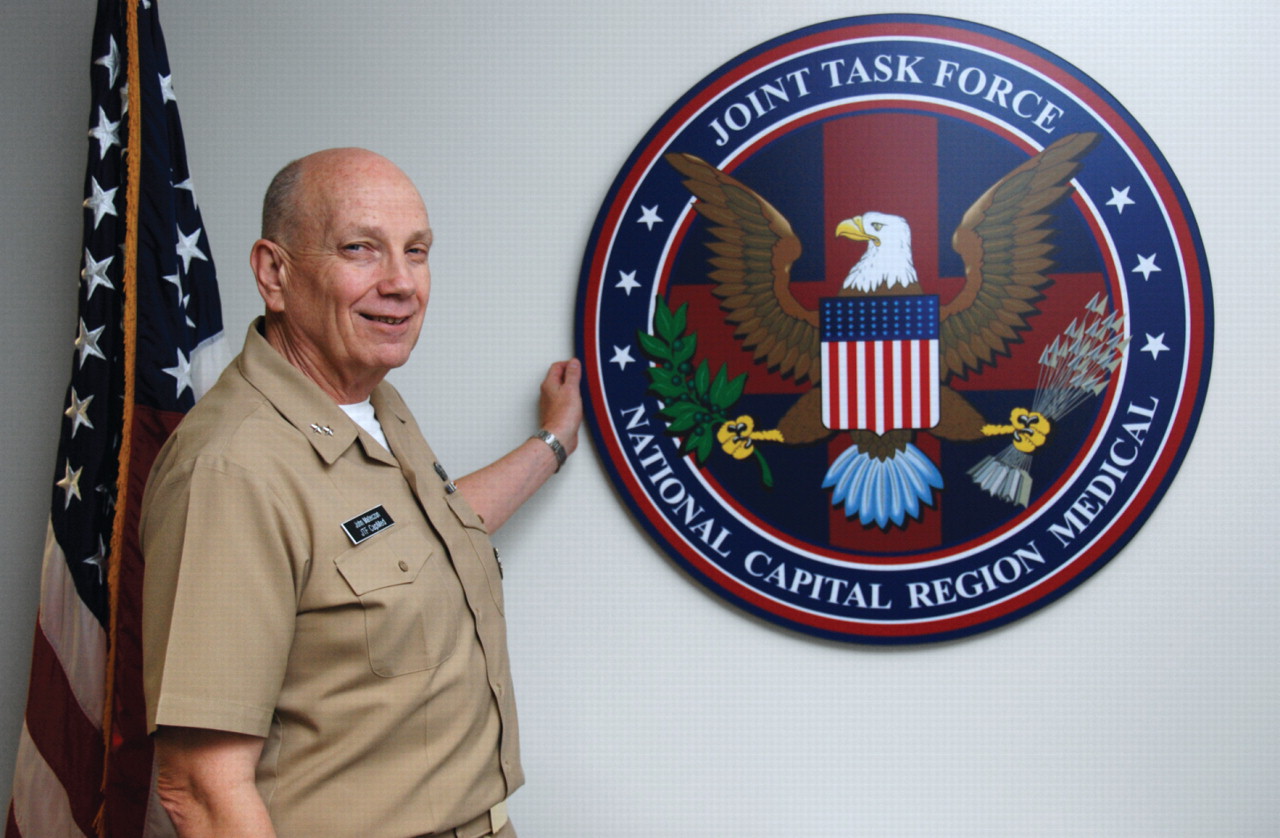Disarming bombs and booby traps in Vietnam might better prepare a future doctor for a career in neurosurgery rather than psychiatry, but it was less the hand-eye coordination and more the ability to compartmentalize and set aside anxiety while doing his job that led John Mateczun into his chosen specialty and now guides him through the most challenging assignment of his career.
Today, Rear Adm. John Mateczun, M.D., M.P.H., J.D., commands the joint task force overseeing the integration and expansion of major military medical systems and facilities around Washington, D.C. The project will take four years to complete, cost $1.2 billion, involve 13,000 people, and merge Walter Reed Army Medical Center and Bethesda National Naval Medical Center—“two institutions with very proud but different histories and cultures”—into one “world-class” military medical center, to be known as Walter Reed National Military Medical Center, he said. In addition, a community hospital at Fort Belvoir, Va., will triple its capacity and an Air Force hospital in Maryland will close.
The project is more than the largest military medical construction project ever. The task force must develop an integrated, regional model of delivering health care based on common clinical and business processes, he said.
At the same time, Mateczun must also ensure that mergers and construction don't interrupt provision of medical services in the entire National Capital Region, which includes Army, Navy, and Air Force facilities in Virginia, Maryland, the District of Columbia, Pennsylvania, New Jersey, and West Virginia.
“We have to make sure that we're still the nation's premier site for casualty reception and for military families,” he said.
Perhaps the fact that the leader of this effort has deep roots in both the Army and the Navy will help him ride herd on the two services.
Mateczun dropped out of college and joined the Army in 1966, volunteering for service as an ordnance disposal specialist.
“Like many things in our lives, there were rational and irrational parts to that decision,” he said in an interview in his office in Bethesda, Md. “I was influenced by people I had known who had done the same job and maybe also by the mystique of bomb disposal.”
The mystique was powerful. After a voluntary second tour of duty in 1969-70 (and a Bronze Star), Mateczun returned to the University of New Mexico.
“Choosing medicine was an outgrowth of my combat experience,” he recalled. “A lot of veterans reflect on what they've been through and try to see its meaning. Surviving that experience leads many to be thankful for that gift and wanting to be of service to others.”
His choice of psychiatry was another step along the same path, part of putting his experience in context, helped by a fellowship at the National Institute of Mental Health during medical school researching biological models of depression. He was commissioned as a Navy ensign in his senior year in medical school.
Residency at the Naval Regional Medical Center in Oakland followed, accompanied by study for a master's in public health at the University of California at Berkeley. That was not his last sojourn in the classroom, however.
While later stationed in Washington, D.C., Mateczun needed to take a course in criminal law as part of board certification in forensic psychiatry. Georgetown University wouldn't permit anyone but law students to take individual courses, so he applied to and graduated from law school.
Law offered a new set of intellectual and cognitive skills and was enjoyable, to boot, he said. “Lawyers and psychiatrists are both able to deal with ambiguity.”
Then, as chair of psychiatry at the Portsmouth (Va.) Naval Hospital, he organized and led mental health teams supporting sailors and their families following two naval tragedies, the downing of a civilian Iranian airliner carrying 290 passengers by the USS Vincennes in 1988 and the accidental explosion in a gun turret on the USS Iowa the following year that killed 47 U.S. sailors.
Both these events highlighted the complexities of mental health care in military settings. Men and women who fight wars—whether they are ground troops, pilots, or ships' crewmembers—may be physically distant from their opponents but have no emotional distance from the results of their action, he said.
“All individuals fear for their own lives and struggle with what they have to do to preserve it,” he said, speaking of the Vincennes, whose crew mistakenly believed it was about to be attacked. “In combat there are many unspoken, private fears and anxieties that people think are not reflective of the best in themselves.”
The two events affected not just the sailors and officers on board each ship but also their families, the communities where they lived, and the readiness of the military unit each ship represented. All required time to cope with the aftermath of tragedy.
Mateczun led teams of psychiatrists and psychologists who brought people together to talk first about the facts of each incident and then, more intensely, about the emotions related to the stress each produced. The teams could help commanders assess the readiness to return to sea by offering insight into the response to stress and trauma.
“Navy and Marine leaders are trained to make decisions,” he said. “We help them with advice.”
He next advised the Marine Corps on setting up and operating combat stress centers in preparation for the Gulf War in 1991 and was subsequently named director of medical services at the National Naval Medical Center in Bethesda.
He eventually served in a number of other administrative and policy roles, at various times planning coordination of military health care services in the northeastern United States, formulating policy for clinical services at the Department of Defense, commanding the Charleston (S.C.) Naval Hospital, and serving as the joint staff surgeon, the medical advisor to the Joint Chiefs of Staff.
While serving in the latter position, Mateczun was at the Pentagon on September 11, 2001. He went to the building's clinic, working with burn victims. Mateczun stayed at the Pentagon through the night of September 11 and the next day, working with firefighters and others.
Part of his current task is a response to that day, preparing those under his command to “think about the unimaginable and be prepared to adjust and react when the worst happens.”
Mateczun's own ability to adjust and react has been tested at every level of military medicine from the stresses of the battlefield in Vietnam to running Bethesda Naval Hospital. Now he will have to combine the steady nerves of the bomb squad sergeant, the broad scope of public health, the clarity of the legal mind, and the decisiveness of the administrator with the more nuanced insights of the psychiatrist to guide the massive ship of regional medical care toward a safe harbor.
“One of the maxims of management is that leaders fall back on their core areas of competence in difficult moments,” he said. “The skills of psychiatry lie in using different models—whether bio/psycho/social or public health—on a daily or even an hourly basis, so you don't have to figure it out anew each time.” ▪


